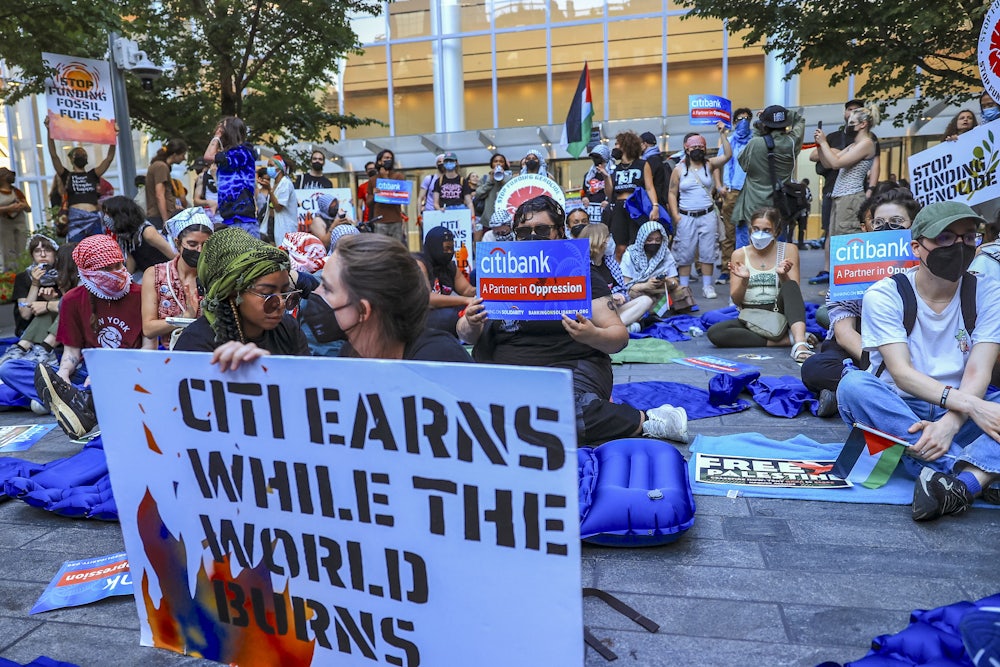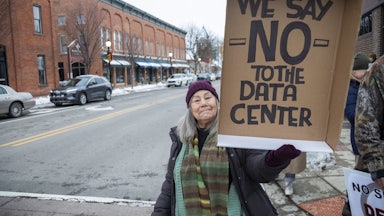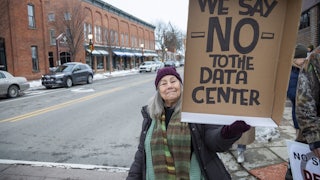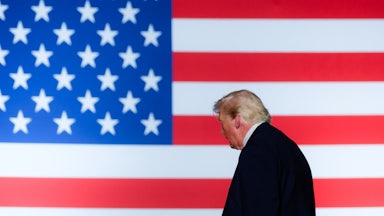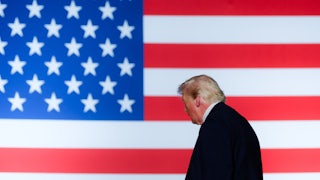Last Thursday, 63-year-old John Mark Rozendaal performed a Bach cello suite outside the Citibank headquarters in New York City, as part of the “Summer of Heat on Wall Street” climate protests. Citibank is the world’s largest investor in fossil fuel expansion since the 2015 Paris Agreement, and the protesters were calling on the bank to stop funding new oil, gas, and coal projects. Rozendaal’s cello bore the slogan, “This machine loves, serves, and protects life”—a more peaceful variation on the famous words on Woody Guthrie’s guitar in the 1940s: “This machine kills fascists.”
Now, for bringing high culture for free to the public while standing up to one of the world’s most powerful polluters, Rozendaal could face seven years in prison. Police arrested him Thursday, saying his cello playing violated the restraining order that was placed on him in July after a former New York City Police Department detective who now provides security services to Citibank claimed that Rozendaal “assaulted” him. The protesters believe the restraining order was unconstitutional and deny that Rozendaal assaulted anyone. The security worker, they told Inside Climate News, hit his head on a PVC pipe that was being used to blockade the bank’s doors.
Rozendaal is not alone in facing ludicrously extreme criminal charges and penalties for climate protest. It’s becoming disturbingly common, as the ruling class seeks to use the criminal justice system to make anyone who disagrees disappear. Sixty-one demonstrators who protested against “Cop City,” Atlanta’s awful plan to build a military-style police academy on the site of a beloved urban forest, have been charged under RICO (a conspiracy law aimed at criminal racketeering), for example. They face a possible 20 years in prison, some for the crime of putting up flyers.
In the United Kingdom, too, climate protesters are facing alarming crackdowns. Last month, five Just Stop Oil protesters who had nonviolently stopped traffic on a major roadway in southern England were sentenced to four years each, with the leader of the group receiving a five-year sentence.
As if these examples weren’t bad enough, the fossil fuel industry is attempting to codify criminal penalties for some forms of climate protest. Pressed by industry donors, Congress has been working to broaden preexisting laws against destroying pipelines—a felony mandating up to 20 years in prison—with more expansive language extending such penalties to people who “[impair] the operation of” pipelines. Indigenous and other environmental activists rightly fear that the whole range of pipeline protests—from sacred rituals to Willie Nelson concerts—could be effectively outlawed. Exxon Mobil, Koch, and other bad actors have been lobbying hard for this, even as peaceful pipeline protesters are already finding themselves facing stiff prison sentences.
While climate protesters are facing the most severe sentences, any protest that makes the ruling class feel unsafe meets with draconian punishment these days. Some of those who protested on university campuses against the war in Gaza this past year were initially charged with felonies (thankfully most of those have been dropped). Students at George Washington University are facing orders to stay away from campus, which will vastly complicate their academic lives, and is, according to local experts, a dramatic departure from past prosecution of protest in the District of Columbia.
Other than the Anglo-American world, where else is protest criminalized to this extent? The answer isn’t pretty: China, Cuba, Bangladesh, Belarus, the United Arab Emirates, Kazakhstan, and other places with authoritarian regimes. These aren’t countries whose political culture most Americans would like to emulate.
But some elites clearly disagree. Just as Donald Trump and Elon Musk think it’s legitimate (and even funny) to talk about firing striking workers, billionaire snowflakes who profit from the climate crisis want to punish anyone who threatens their complacency, or their ability to ravage our planet unimpeded.
This isn’t the image that most Americans have of our society. In states where teaching about racial oppression hasn’t yet been banned, children still learn in school about the arrest of Rosa Parks, a civil rights heroine, in 1955 for refusing to give up her seat on the bus to a white man. Of course, many civil rights activists were brutally beaten and some even lost their lives, but in this widely taught and iconic incident, Parks spent a couple hours in jail and paid a fine of $14. Parks is honored with a statue in the U.S. Capitol, a symbol of how highly protesters are esteemed and venerated. Today, if a few billionaires didn’t approve of her protest, things would undoubtedly have played out quite differently.
Democrats have, over the past year—OK, admittedly eight years—nattered on ad nauseam about “saving our democracy” from Donald Trump. But Rozendaal is facing this punishment in New York, a blue city in a blue state. And most of the elite college campuses where protesters were arrested this past year are run by liberals, as any right-wing news outlet will be happy to tell you. Democrats’ “Save our democracy” pitch might resonate more if liberals weren’t helping to turn our society into a dictatorship dedicated to protecting the delicate sensibilities of the ruling class. Maybe it’s good that Democrats have pivoted in their campaign pitch to “The other guys are weird.” That, at least, is indisputable.
